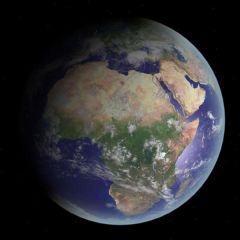Difference between revisions of "Earth"
Jump to navigation
Jump to search
(Added a link.) |
(Moved stub tag.) |
||
| Line 1: | Line 1: | ||
| − | |||
| − | |||
{| cellpadding="2" cellspacing="0" style="margin:25px 0 0 10px; border:3px solid lightsteelblue;width:250px; font-size:90%; font-family:'Arial','Helvetica'; float: right; clear: right;"Earth in Orbiter" | {| cellpadding="2" cellspacing="0" style="margin:25px 0 0 10px; border:3px solid lightsteelblue;width:250px; font-size:90%; font-family:'Arial','Helvetica'; float: right; clear: right;"Earth in Orbiter" | ||
!bgcolor="lightsteelblue" colspan="2" align="center" |Earth | !bgcolor="lightsteelblue" colspan="2" align="center" |Earth | ||
| Line 90: | Line 88: | ||
{{SolarSystem}} | {{SolarSystem}} | ||
| + | |||
| + | {{Planet-Stub}} | ||
Revision as of 12:08, 12 June 2021
Earth is the planet we live on. It is the third planet from the Sun. It is the only planet known to have life on it. Lots of scientists think the earth formed around 4.5 billion years ago. It is one of four rocky planets on the inside of the Solar System. The other three are Mercury, Venus and Mars.
Natural satellites
See also
- Addons for Earth
- Earth at Wikipedia
External links
Earth at Wikipedia
| edit The Solar System | |
|---|---|
| Central star |
Sun (Sol) |
| Planets |
Mercury - Venus - Earth - Mars - Jupiter - Saturn - Uranus - Neptune |
| Natural satellites |
Moon - Phobos - Deimos - Io - Europa - Ganymede - Titan - more... |
| Add-ons |
Planets - Dwarf Planets - Small objects - Natural satellites - Alternative star systems |
 | This article, about a planet, is a stub. You can help Orbiterwiki by expanding it.
|
